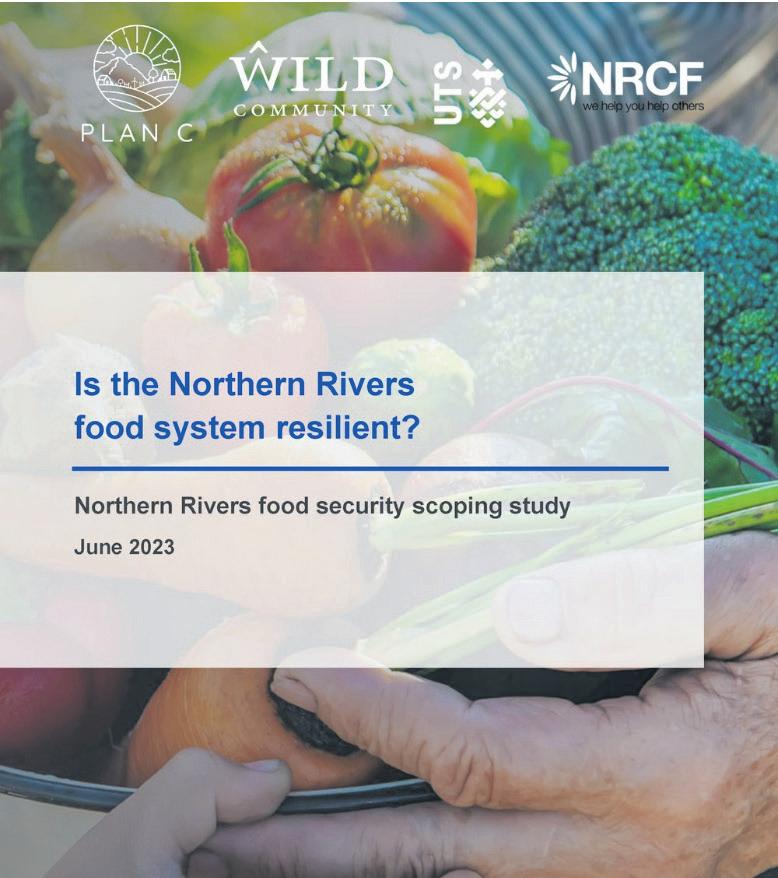
2 minute read
Our Food security challengers and opportunities
In the face of already, numerous adversities, the Northern Rivers of NSW is grappling with yet another concern: food security. Floods, bushfres, and the ongoing impact of the COVID pandemic have exposed vulnerabilities in the region’s food system but also presented an opportunity to re-think how food is grown, distributed and consumed.
A new study conducted by Plan C, UTS Institute for Sustainable Futures (UTSISF) and Wild Community, funded by the Northern Rivers Community Foundation, aimed to address these issues by exploring the state of food chains in the Northern Rivers. The study can be found at: https://www. planc.org.au/foodsecurity.
The scoping study began in late 2022 to develop an understanding of regional food networks in the Northern Rivers, identify food security challenges and opportunities during recent disaster events and provide recommendations for developing greater resilience within the regional food system.
The study found that food insecurity is widespread across NSW and Australia and affordable and healthy food is not always accessible, particularly for disadvantaged communities.
Long food supply chains have compounded the vulnerability of the Northern Rivers food supply during disasters. Interviews underscored that while some opportunities arose during COVID for food businesses to shift their practices such as using online sales, the impacts on livelihoods from the compounding events of 2019 bushfres, COVID pandemic and multiple unprecedented foods shed a light on signifcant problems.
For example, in the 2022 foods home kitchens were swept away, farms inundated, supermarkets empty, refrigeration in homes and businesses lost power and road freight ceased, highlighting key weaknesses in the system.
“When approaching this complex problem, a food systems approach is necessary” explains Fiona Berry, Research Principal at UTS-ISF. Food must be viewed as a complex system rather than a linear supply chain, with its activities having far-reaching impacts on the environment, populations, and economies.
One of the major fndings of the study is the lack of a coordinated government approach to disaster food security, with the burden of addressing food insecurity falling on the community.
“The strength of the community response in the Northern Rivers is a hidden contributor to food supply during disasters” said Jean Renouf, CEO of Plan C. Community-led local farmers markets, social networks activating pop up kitchens, farmer networks and locally supplied retailers, adapted quickly following the foods and were able to continue supplying food to the region.
“Northern Rivers community champions have been localising the food system for years and our social capital is a hidden strength” said Sheriden Keegan, a Griffth University PhD researcher on the study.
The study provides 10 key recommendations for creating a resilient and thriving food system in the Northern Rivers. These echo the recently released CSIRO Reshaping Australian Food Systems
2050 Roadmap (which can be found at: https:// www.csiro.au/en/news/ All/News/2023/June/ CSIRO-roadmap-chartsAustralias-food-andnutrition-security-by-2050) and other initiatives happening elsewhere in regional Australia like the Canberra Region Food Collaborative, Sydney Food Futures, Logan Local Food Map, Cardinia Food Circles and Bega Circular Valley. Expanding existing local food initiatives to make the transition to a circular food economy for the Northern Rivers in 2023 will require:
• enhanced food infrastructure
• support for food produced in the region to be bought and sold locally
• arable land protection
• accessible food hubs
• awareness and education on the benefts of local food
• listening to traditional knowledge
• strong governance through a community-led regional food plan and policy








